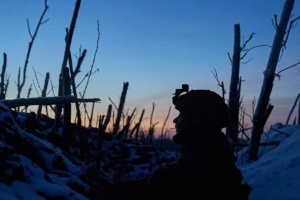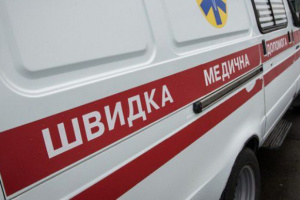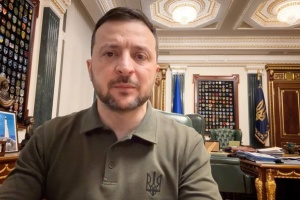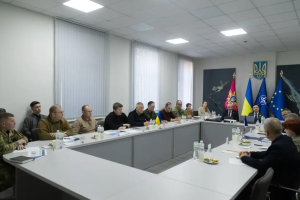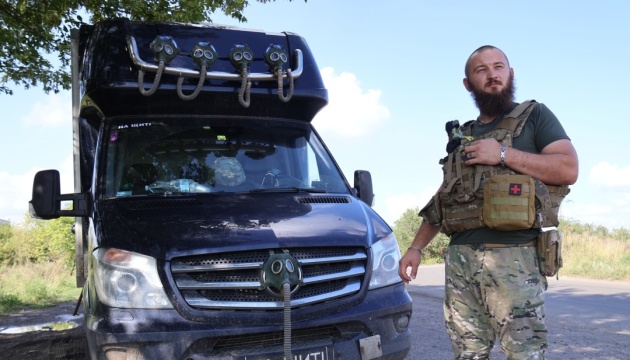
Soldier with call sign "Dykyi" take fallen heroes on their last journey
In the combat zone, an Ukrinform journalist met with a soldier of the 72nd Brigade's medevac team with the call sign "Dykyi" who brings bodies of fallen heroes from the front line and prepares them for burial.
He opened the door of the "freezer" of his bus, which was covered with tactical film with the inscription "On the Shield". I was expecting a specific smell, because I had already seen the vehicles that bring the dead soldiers. Instead, a chill broke into the hot August summer. But among the shining whiteness of the cell, there was a fresh bloodstain on the floor.
- Sorry, I didn't have time. Usually I wipe the car down, I have disinfectants and cleanliness here, says Vlad, who is on his way to take the dead guys from the front line or the staging area.
We are standing under a magnificent old tree on the outskirts of a frontline town in Donetsk Oblast, at a fork in the road leading to occupied Marianka. And the symbolism makes my heart clench. A dozen and a half kilometers away, the territory occupied by the "Russian world" with all its barbarism, torture chambers, and Sovietism begins.
Here, in the shops, customers are quickly dismantling Ukrainian flags. And between them, there is a bus called "On the Shield," in which those who died for Ukraine are taken to the morgue, and sometimes to their homes... This is a visualized "price" of our freedom and the fact that Ukraine lives and will win.
From this part of the front, the bodies of the fallen defenders are transported by Vlad, call sign "Dykyi", a fighter with the 72nd Brigade's medevac unit. He has not yet turned 30 and got married the day before the Great War.
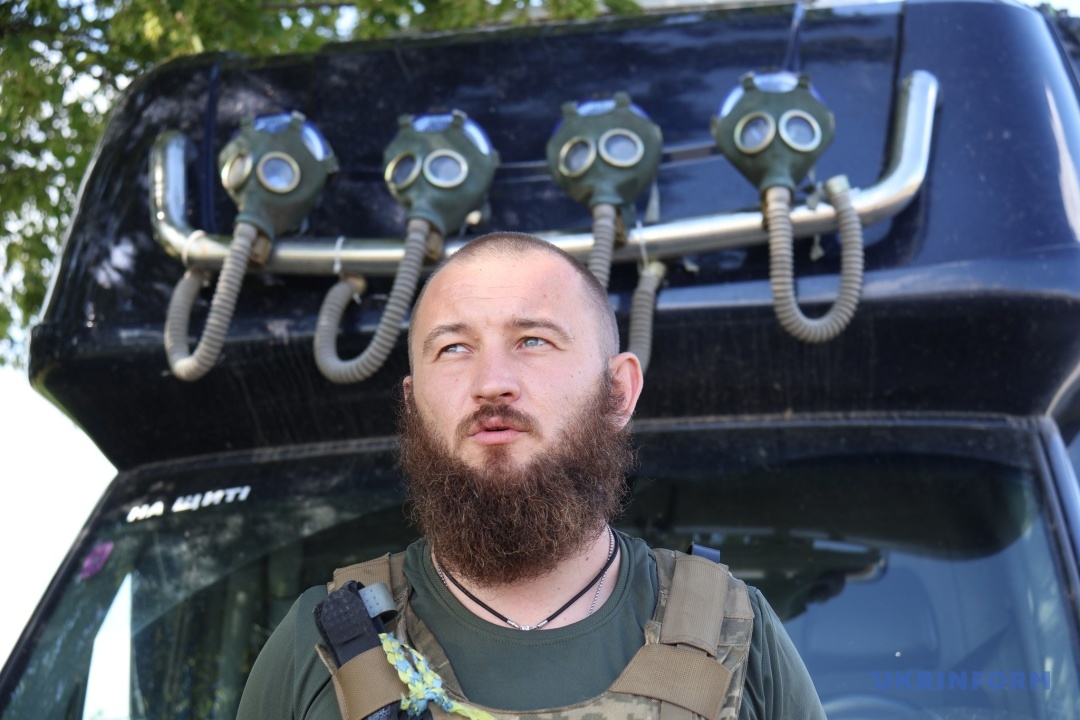
- When Putin declared the DNR/LNR his territories, I immediately packed an "alarm bag" and told my future wife: it's only a matter of days before the war, they will come here. She said, "No, it can't be, we have to get married. And we were getting married on February 22, 2022. I said: we'll have time to take a vacation and I'll go. And so it happened: On the 22nd we celebrated the wedding, and on the 24th I went to war. My brother served in Ochakiv, Mykolaiv region, as a commander of a military unit, in the navy. He called me and said, "Get up, brother, the war has started," and I heard a whistle and an explosion in the phone. Later I called my brother - no connection, and again - no connection. Then I went to the 72nd Brigade, I've known it since 2014 from the Donetsk airport, because I was serving my military service and brought them ammunition. They took it. My father and brother followed me there...
When the full-scale invasion began, new mourning traditions had not yet been formed. The procedure for delivering those who laid down their heads had not yet been established. Vlad met the war with his brigade near Kyiv. He served in a medevac unit.
- We were near Moshchun, in the direction of Pushcha-Vodytsia. We went and took the wounded from the "zero". We also took the dead... It happened that we were carrying both the wounded 300th and the 200th [dead] in one vehicle. Because when we take out the wounded and see the body lying there, we take it away... That's how this tradition began. This is a duty that must be fulfilled, because our brothers fell defending us, and their families should at least receive their bodies.
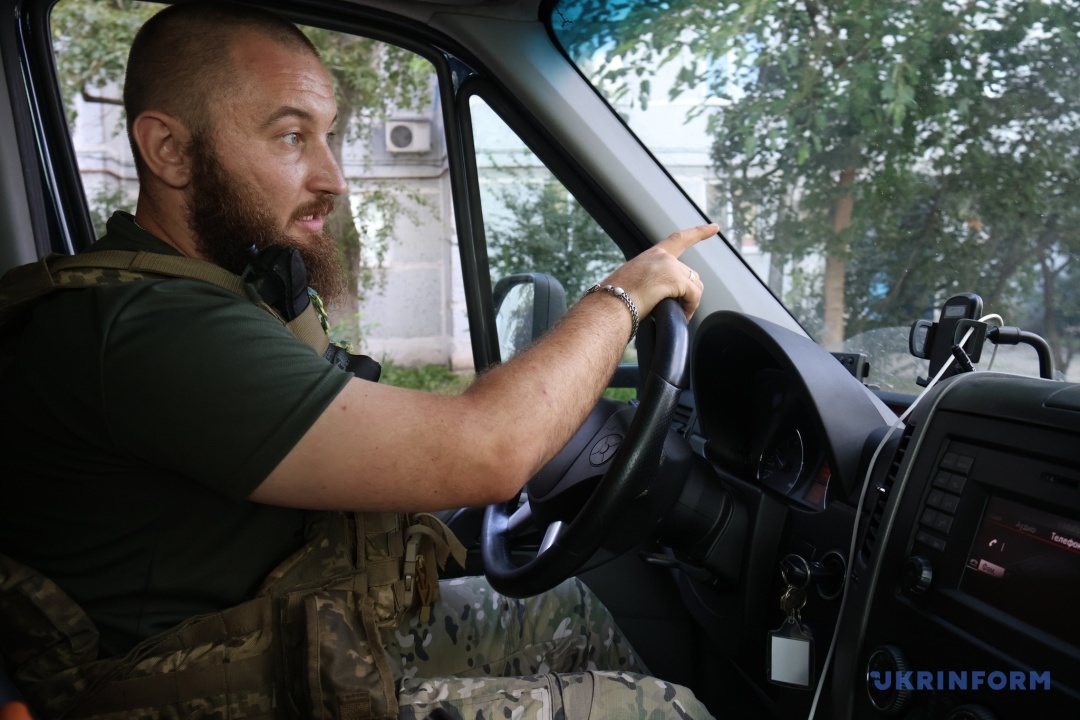
My brother died on the first day... The one who managed to call and say that the war had started. It was the first news about the war and the last words I heard from my brother. The ship "Horlivka", where he served, took the first hits. We then started looking for his body. I then delivered the bodies of their relatives from different parts of the frontline to parents and wives in different parts of the country, and I was looking for my brother's body with my family.
We managed to find it after four months, and all this time the orcs were blowing our brains out. They called the family and said: if you want your son back, pay money, and their price tags changed every time, like the weather in Donbas. But no one paid anything to anyone. Friends through friends, through volunteers, helped to deliver the body. Then the DNA procedure... I was asked: did you have a psychological trauma? I said: no, I didn't. It is now forever...
Now there are special morgues where we put the dead Russians. We exchange the dead for the dead. On one package with an orc, I wrote: from Dykyi.
I think for a moment about our traumas. About the young man who, from the first days of the war, put the bodies of heroes killed in the defense of the capital in his car (without having either church "obedience" or a mandate from the authorities). He probably saw them as his dead brother. I also think of the Horlivka ship, which had a well-trained crew and had repeatedly participated in joint exercises with NATO. All facilities and ships associated with Western partners have become objects of special hatred for Russians.
...We are driving through the streets to the morgue. Vlad decided to show us the beginning of the hero's last route. We arrive at the morgue, and I see a picture that I have already seen in another frontline town and to which it is impossible to get used to. At the entrance to the morgue, there are neatly stacked stretchers, bloody stretchers... Sometimes guys are brought on them either from the "zero" or from the staging area, if they could not save them there. There is a tank next to it. There is something that is unthinkable to pass on to the family - a bloody helmet...
This time, there are tightly packed bodies of civilians who died in this community from an enemy missile attack...
XXX
Since the brigade has been in the East, I have been engaged only in evacuating the dead, Vlad continues. "I pick them up either at the evacuation point or at the staging area, and bring them here. Here, in a special room nearby, I make an inventory of the things that were on the deceased. The next day I hand over both the inventory and the belongings to the commander. In the morning, I send the body to the Dnipro in another vehicle, and volunteers take it further. In general, most organizations involved in evacuation have common chats. Sometimes I get calls from relatives of the deceased asking me to confirm the information... And no matter how much I want to comfort them or just answer, I say: you have the wrong number. Because a special officer informs the family about the death of a soldier.

It happened that a very, very good friend of mine, who taught me how to properly load an assault rifle back in 2013-2014, was killed. We asked, and the command allowed me to take him home in this car and attend the funeral. All our brothers came.
Not so long ago, this vehicle was completed, thanks to volunteers who immediately equipped it. Here at the top: there is a compartment above the cab so that I could sleep before the return trip, if I didn't manage to when I was driving the hero home. It is called a "chicken coop".
...Our conversation is interrupted by a phone call.
- "My wife," Vlad says, a little embarrassed, "hasn't had a vacation in a long time. So she came to see me herself. Isn't that a honeymoon during the war? I sent her home yesterday.
He picks up the phone and speaks gently to his wife, and adds at the end:
- "And send me a photo of me in the embroidered shirt you made.
"People ask me why you put a gas mask on the outside of the cab," Vlad continues. "I just found a gas mask once, pulled it over my face to check if I had put on weight, if the gas mask was tight, or if my beard needed to be trimmed. And then I put it on the cab, so now people can see and recognize the vehicle. In general, the car is not new, you need to take care of it. The brake system broke down, so I ordered spare parts in Germany because it was cheaper, and I changed it myself.
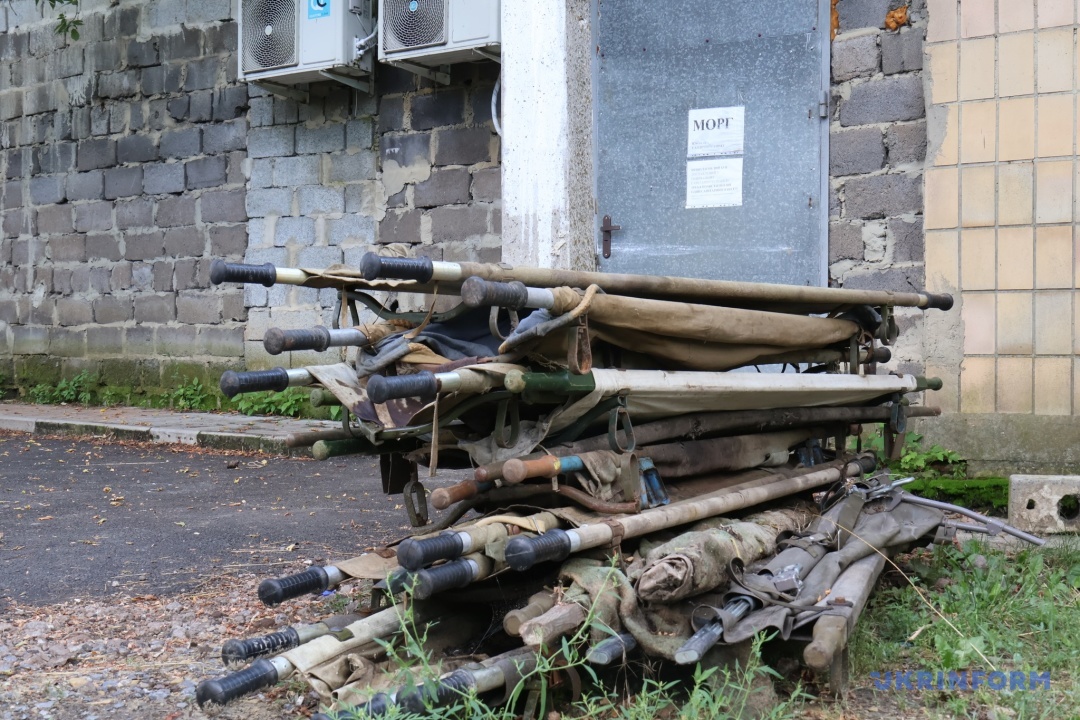
This year there were losses because of Bakhmut... Thank God, now our boys are the best, well done, now there are almost no losses, I am now "resting". When I don't have to work, I change clothes, roll up my sleeves, help the guys fix cars or do something else.
Sometimes people ask me how it feels to be with the fallen all the time. I say: I'm used to it. At first, I used to dream about all sorts of things, exploding at night. It is no longer scary that you are carrying a dead man, and at the front - you know - something can fly somewhere and you will lie down next to him. But I don't pay attention to that anymore. If it's fate, it's fate. If not, then not.
I saw the corridors of honor in every region. I took a fighter to Cherkasy region. There was a human corridor eighteen kilometers long. The longest one... And people were throwing flowers and embroidered towels on the asphalt along these eighteen kilometers. They blocked all the streets, left just one central road, and everyone went to honor the soldier.
Yes, we have learned how to bury heroes. But how happy I am when I don't have a job and don't get a call from the "zero" all day long...
Lana Samokhvalova, Kyiv - Kurakhove - Kyiv
Photo by Pavlo Bagmut


